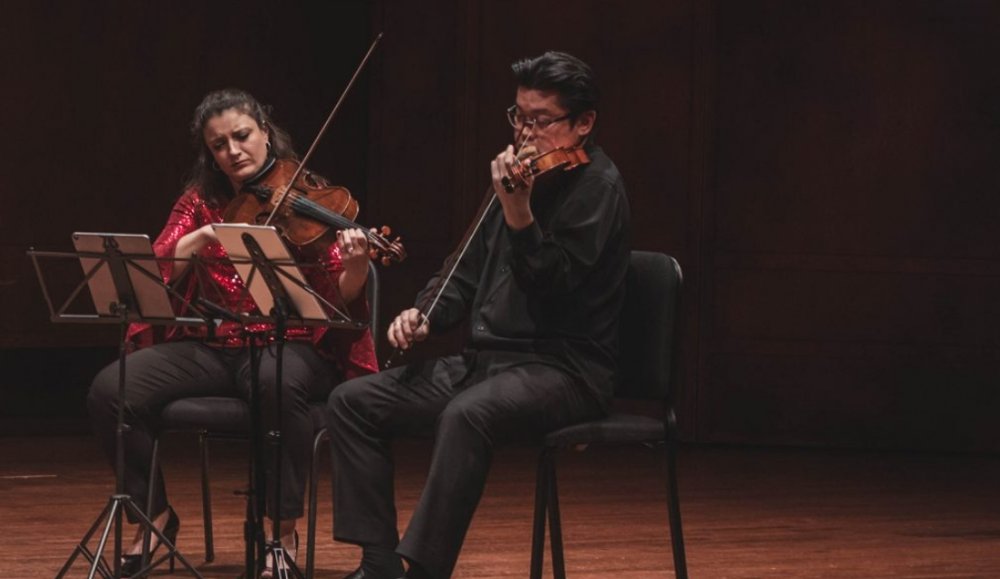In pianist Orion Weiss’s introductory remarks on his pre-concert recital, he informed Nordstrom Recital Hall attendees of a late addition to his scheduled program: the Berg Piano Sonata, op. 1., a single movement work written in 1909., Weiss paired it with a three-movement work of a similar cast, the Martinů Piano Sonata (1954.)
These pieces are unfamiliar to most concertgoers, even die-hard fans of the Seattle Chamber Music Society Summer Festival, now taking place at Nordstrom Recital Hall. Weiss played the Berg first, emphasizing articulation over architecture. I know the work from Glenn Gould’s titanic 1958 recording and almost didn’t recognize it. Weiss found a way to link its chromatic lyricism to the pianistic legacy of the 19th century rather than Gould’s more percussive 20th century approach.
The vibe at the festival, dubbed “The World’s Largest Chamber Music Party,” is indeed festive. As the stature and reach of the event has grown over time, the family-reunion feeling remains. Perhaps that explains the giddiness during intermission. Inside the concert hall, there’s nothing anachronistic about music speaking to your heart or grabbing you by the throat.
Sunday’s program did both of those things expertly. Schubert’s Piano Trio in E-flat, called “Notturno,” is a lone movement written in 1827. As the name implies, it’s principal mood is serene, and violinist Andrew Wan and cellist Sterling Elliott played the song-like opening phrases with a reverential hush. Pianist Alessio Bax kept things moving, employing a legato that never cloyed.
The four artists mentioned above are part of a corps of 39 recruited by SCMS Artistic Director (and violinist) James Ehnes and his team to participate in a series of 12 concerts throughout July. This season SCMS has programmed works by at least 40 composers, half representing the “core” repertoire of the 18th and 19th century, the other half written in the 20th century. Add to that a handful of 21st century compositions, some of them SCMS commissions. These diverse offerings, the familiar and the new, are integral to the festival’s packed-house success.
The Grieg Violin Sonata No. 2 in G, performed by Ehnes and Weiss, provided the anchor for the first half. Grieg wrote it in 1867, while still in his twenties, but it bears many of the hallmarks of his later compositions. Incorporating the sounds of his native Norway, specifically Norwegian folk music and fiddling techniques, was the overarching quality, and yet it shows its beautifully carpentered structure as clearly as anything by Grieg’s friend Brahms. In the hands of Ehnes and Weiss, virtuosic eruptions folded seamlessly into well-paced lyrical episodes. Phrasing details were scrupulously observed and the performers kept attention riveted through to the sprint at the finale.
The piece featured in the concert’s second half, Mieczysław Weinberg’s Piano Quintet op.18, written in 1944, has many of the same traits as Shostakovich’s Piano Quintet of 1940, especially the violent digging and constant harmonic tension.
Members of the Ehnes Quartet — violinist Amy Schwartz Moretti, violist Che-Yen Chen, and cellist Edward Arron were joined by SSO concertmaster Noah Geller and pianist Yulianna Avdeeva. As the five-movement work unfolded, I understood why Shostakovich championed the young Soviet musician, saying of him, “A fine composer…but definitely too modest.” All that unbearable unease remained, but in this performance it translated into excitement. Weinberg unfolds one clever device after another, and in the second movement he creates all kinds of magical effects using col legno bowing, pizzicato, and harmonics.
An inebriated waltz follows, unexpectedly. My wife commented that most of the fun of digesting an unfamiliar piece like this is watching five performers on high alert, all using subtle visual cues to guide each other through treacherous musical territory — but mostly just breathing together and using their ears.
The heart of the piece is the slow movement, a high-wire act bounded by a stentorian unison phrase. In between Avdeeva took control of things, never stepping on string passages but punctuating phrases with total authority. The movement closed at a quiet pitch. As the audience exhaled the gentlemen next to us whispered “Holy Smokes.”
Discover more from Post Alley
Subscribe to get the latest posts sent to your email.
